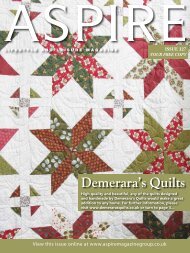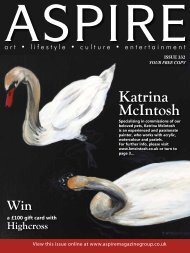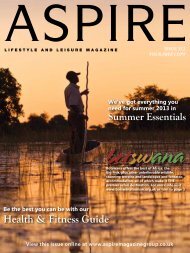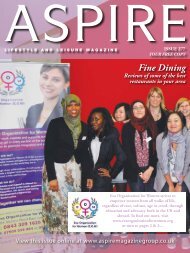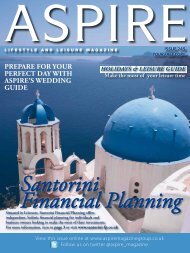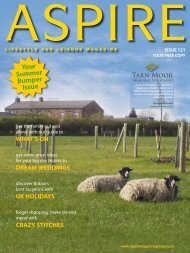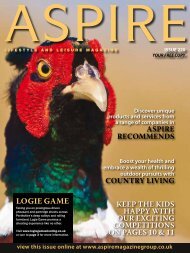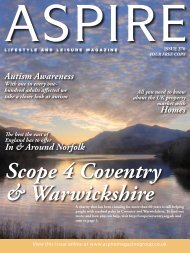Martin Dalby - Aspire Magazine
Martin Dalby - Aspire Magazine
Martin Dalby - Aspire Magazine
You also want an ePaper? Increase the reach of your titles
YUMPU automatically turns print PDFs into web optimized ePapers that Google loves.
Supporting Those With,<br />
& Those Affected By,<br />
Myotonic Dystrophy<br />
Myotonic Dystrophy is just one condition that affects<br />
the muscles. The exact cause is unknown however<br />
the genetic change responsible has been identified.<br />
The genetic change (mutation) that causes Myotonic<br />
Dystrophy is in the DMPK gene found on chromosome<br />
19. At one end of the gene is an area where three<br />
of the building blocks of DNA, the genetic material,<br />
CTG are repeated. An unaffected individual will have<br />
5-35 CTG repeats but in an individual with Myotonic<br />
Dystrophy the repeat is unstable and expands. The<br />
extent of the expansion ranges from 50 in a mildly<br />
affected individual to several thousands in a severely<br />
affected individual. This is the basis of genetic tests as<br />
the number of CTG repeats can be counted. Somehow<br />
the CTG repeat changes the DMPK gene and results in<br />
Myotonic Dystrophy. The gene controls the production<br />
of a protein called Myotonic Dystrophy Protein Kinase<br />
which appears to be very important in many systems<br />
of the body.<br />
The Myotonic Dystrophy Support Group (MDSG) is a<br />
registered charity, founded by Margaret Bowler in 1989,<br />
dedicated to offering the hand of friendship and support<br />
to all those affected by Myotonic Dystrophy. Totally run<br />
by volunteers, they have a central Helpline and a network<br />
of regional contacts throughout the United Kingdom, as<br />
well as extensive links abroad. Their mission is ‘to offer<br />
assistance, support and information to those people<br />
affected by Myotonic Dystrophy, their carers’ and families’.<br />
Myotonic Dystrophy is a highly variable condition so it<br />
is difficult to predict how one individual will be affected.<br />
The range of symptoms and severity of symptoms both<br />
vary enormously. Age at onset when the condition first<br />
appears ranges from birth to old age. Although the<br />
disease is highly variable it can be broadly grouped into<br />
four categories:<br />
1. Minimal - Individuals develop symptoms late in life.<br />
Cataracts are often the only symptom or there may also<br />
be mild muscle involvement.<br />
2. Classical or adult onset - This begins in adult life and is<br />
characterised by muscle stiffness and slowly progressive<br />
muscle weakness. Other systems can be involved in<br />
varying degrees.<br />
3. Childhood onset - This begins during childhood, but<br />
with no problems at birth. Like adult onset it can cause<br />
muscle weakness and stiffness, but sometimes it can also<br />
cause learning difficulties, glue ear and eye problems.<br />
4. Congenital Myotonic Dystrophy - This is the most<br />
marked form of the condition and is present from birth.<br />
Babies with this can be quite ill, with breathing and<br />
swallowing difficulties around the time of birth. Children<br />
with it have fewer problems with muscle weakness than<br />
adults, but they can often have problems with learning<br />
difficulties, glue ear and eyes.<br />
Myotonic Dystrophy can also cause:<br />
• Muscle Weakness<br />
• Myotonia - difficulty in relaxing a muscle after it has<br />
been contracted<br />
• Heart Problems<br />
• Chest and Breathing Problems<br />
• Tiredness and Sleepiness<br />
• Digestive Problems<br />
• Eye Problems, such as cataracts<br />
• Speech and Jaw Problems<br />
• Problems with Thinking And Planning<br />
• Male Infertility<br />
• Diabetes<br />
At present, there is no cure for Myotonic Dystrophy<br />
but this may change as a result of rapid progress in our<br />
understanding of how the disorder is caused - meanwhile<br />
all people with Myotonic Dystrophy can help themselves<br />
by knowing about their condition, recognising and<br />
avoiding hazards, and by informing doctors and other<br />
professionals.<br />
<strong>Aspire</strong> Sales Manager, Stacey Wragg, added: “There are<br />
many ways in which our readers can help MDSG: you<br />
can donate, either as a one-off or as a regular monthly<br />
contribution. Even more conveniently, you can now<br />
donate by text message via Just Giving; just text MDSG02<br />
(space) + Amount to 70070. Alternatively, for a nominal<br />
annual subscription of £15 per family, you can show<br />
your willingness to share in the Group’s concerns. By<br />
doing this, you will receive a regular Newsletter and<br />
information about the latest activities, as well as discounts<br />
on attendance at the Group’s events and products.<br />
Finally you can find your own imaginative way to raise<br />
much-needed funds for the charity – just don’t forget to<br />
tell MDSG about it, and send them a report of how your<br />
effort went, preferably with a photograph that could be<br />
published on the website as well as in the newsletter.”<br />
MDSG are one of eight charities<br />
featured at <strong>Aspire</strong>’s Winter<br />
Wonderland Charity Auction<br />
(sponsored by Mem-Saab) on Friday<br />
December 7th. Tickets cost just £5<br />
per head and all proceeds raised<br />
will be split evenly between eight<br />
worthy causes. To get your ticket<br />
to this fantastic event, just email<br />
north@aspiremagazinegroup.co.uk<br />
Helpline: 0115 9870080<br />
Website: www.myotonicdystrophysupportgroup.org<br />
Registered Charity No: 1134499



